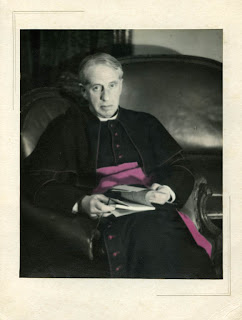 One of my favorite writers is Ronald Knox. A key book on my journey home to the Catholic Church was his masterwork, The Belief of Catholics, published by Ignatius Press. The following is excerpted from his ignatiusinsight.com author page:
One of my favorite writers is Ronald Knox. A key book on my journey home to the Catholic Church was his masterwork, The Belief of Catholics, published by Ignatius Press. The following is excerpted from his ignatiusinsight.com author page:Monsignor Ronald Knox (1888-1957) was the son of the Anglican Bishop of Manchester and it appeared that he, being both spiritually perceptive and intellectually gifted, would also have a successful life as an Anglican prelate. But while in school in the early 1900s Knox began a long struggle between his love for the Church of England and his growing attraction to the Catholic Church.
For many years he harbored the hope that somehow, by God’s providential working, the Church of England would be reunited with Rome. But in 1917, four years after being ordained in the Church of England, Knox became a Catholic; two years later he was ordained a priest. Upon being received into the Catholic Church he expressed his great relief and sense of joy:
"I have been overwhelmed with the feeling of liberty – the “glorious liberty of the Sons of God;” it [is] a freedom from the uncertainty of mind; it was not until I became a Catholic that I became conscious of my former homelessness, my exile from the place that was my own" (Quoted in Fr. Charles B. Connor’s Classic Catholic Converts [Ignatius Press, 2001],150).
Like all great preachers and teachers, Knox had a gift for distilling complex matters into understandable and compelling language, and his wry humor makes his lucid writing that much more enjoyable. This was certainly true of his greatest apologetic work, The Belief of Catholics, written in 1927 (and recently republished by Ignatius Press). In it he addressed modernism and the growing skeptism in England about the claims of Christianity; he also took on arguments made against the Catholic Church by various Protestants, many of which are still commonly used by certain Fundamentalists and Evangelicals today. One of these is the faulty claim that a Christian is not dependant, whether historically or practically, upon the Catholic Church for correct doctrine, but that all a believer needs is the Bible. In The Belief of Catholics, in a chapter titled “Where Protestantism Goes Wrong,” Knox demonstrated that how one views the Church will either make or break the basis of their view of Christ, the Bible and authority:
"… a proper notion of the Church is a necessary stage before we argue from the authority of Christ to any other theological doctrine whatever. The infallibility of the Church is, for us, the true induction from which all our theological conclusions are derived. The Protestant, stopping short of it, has to rest content with an induction of the false kind; and the vice of that false kind of induction is that all its conclusions are already contained in its premises. Perhaps formal logic is out of date; let me restate the point otherwise. We derive from our apprehension of the living Christ the apprehension of a living Church; it is from that living Church that we take our guidance. Protestantism claims to take its guidance immediately from the living Christ. But what is the guidance he gives us, and where are we to find it?"
The claim of many Christians that it is the Bible which fully guides them and provides the final say in matters of their faith is inconsistent and cannot stand in the face of reason:
"In fact … the Protestant had no conceivable right to base any arguments on the inspiration of the Bible, for the inspiration of the Bible was a doctrine which had been believed, before the Reformation, on the mere authority of the Church; it rested on exactly the same basis as the doctrine of Transubstantiation. Protestantism repudiated Transubstantiation, and in doing so repudiated the authority of the Church; and then, without a shred of logic, calmly went on believing in the inspiration of the Bible, as if nothing had happened! Did they suppose that Biblical inspiration was a self-evident fact, like the axioms of Euclid?"
As Knox indicates, not only does the Bible itself not teach that it is the final and sole authority in the Christian life, this belief ignores the historical facts as to how we received the Bible and by whose authority the canon of Scripture has been set. The Catholic Faith is a seamless garment which demands “all or nothing”; if someone accepts the authority of Scripture, it is logical that they, like Ronald Knox, must also accept the authority of the Catholic Church — it is both necessary and consistent.

No comments:
Post a Comment